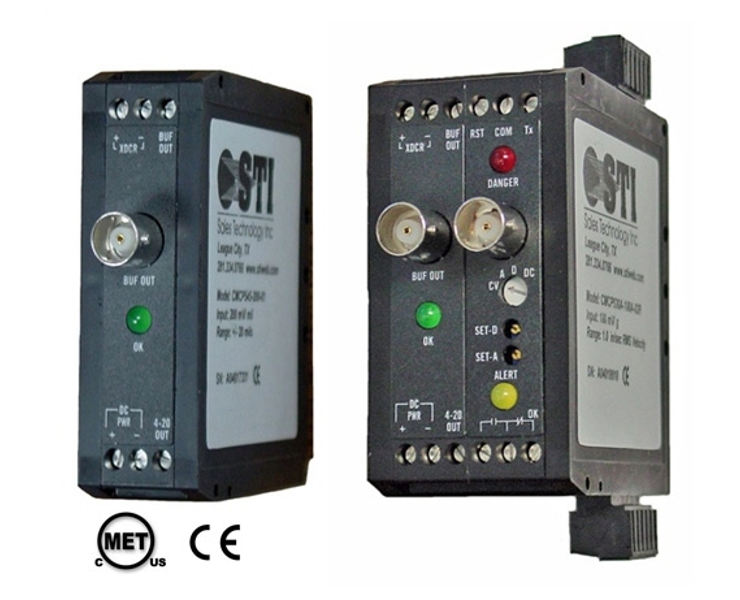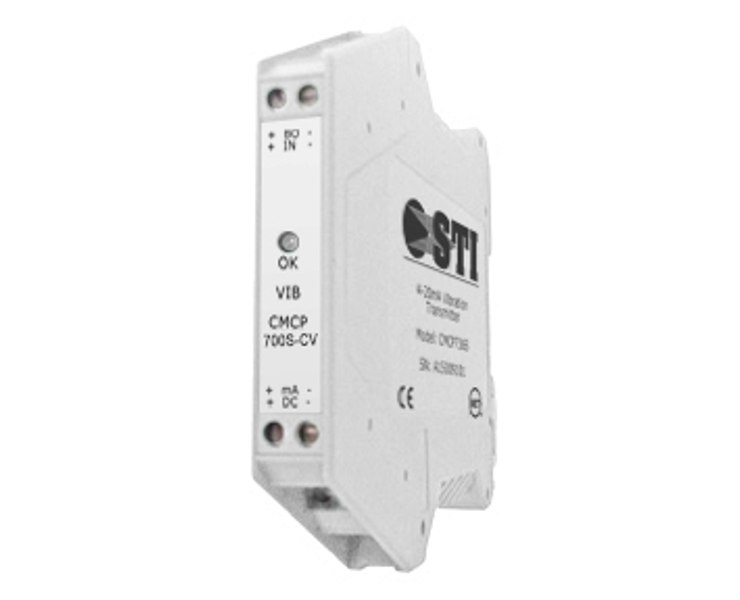CMCP540 Radial Vibration Transmitter/Monitor
Kluczowe cechy:- Proximity Probe In
- Displacement Out
- Transmitter or Monitor
- Peak to Peak Detection
- 200 mV/mil (7.8 mv/mm)
- 4-20 mA Output
- 2 Buffered Outputs
- 5 Selectable Ranges
- Fault (OK) Detection
- CSA & UL C1,D2
- DIN Rail Mount
- Optional HP & LP Filters.
The
CMCP540 Displacement Transmitter is compatible with all manufactures Eddy Probe or Proximity Probe Systems with a voltage output of 200 mv/mil and is available in English or Metric scaling. The CMCP540 checks for faults, processes the vibration signal to determine overall amplitude, and outputs a 4-20 mA dc current that is proportional to a user selected range of 0 to 5, 10, 15, 20 or 25 mils (0 to 127, 254, 381, 508 or 635 microns). Combining transmitters with an existing PLC or DCS system results in a high density, low cost vibration monitoring system.
The Optional Alarm Module provides ok, alert and danger relays, selectable time delay, trip multiply, bypass and 0 to 5 VDC outputs for displays. The relay outputs can be used to trigger machine shut-down or other alarms. Combining transmitters with an existing PLC or DCS system results in a high density, low cost vibration monitoring system. Alarms relays and trip multiply are available with the Monitor version. Alarms – The CMCP500A Series Monitors have two independent set points, with LED alarm indicators and output relay contacts (Alert and Danger). Set points are adjustable via potentiometer, from 0 to 110% of full scale. Each has an adjustable delay of 1 to 10 seconds. SPST Relay contacts are rated 5 Amps @ 30 Vdc or 250 Vac for resistive loads. Relay contacts can be independently configured by the user for either Normally Open (NO) (Standard) or Normally Closed (NC) operation. Relays are normally de-energized and can be configured for latching or non-latching (standard) operation. Latched alarms may be reset locally or by remote contact closure. Trip Multiply – The monitors have set point multiplication of 3X via contact closure (2X available). To avoid tripping the alarms during machine start-up.
Custom Input and Output Calibrations are Available on Request.
Buffered Output: A BNC connector mounted on the front of the unit provides access to the buffered transducer output signal. This includes both the unfiltered vibration signal, and the DC bias voltage. Portable test equipment or analyzers can be connected to this output without disturbing other system outputs.
Fault Detection: On board fault detection circuitry continuously monitors the transducer for normal operation. If a fault occurs, the output current is reduced to <2 mA to indicate the fault to the readout system. A green LED on the front of the unit is turned off to provide a local indication of the fault.
Filters:For applications that require monitoring specific frequency bands, optional high-pass and low-pass filters can be specified. These filters are modular and can be installed by the factory or in the field. Each module attenuates out-of-band signals at a rate of approximately 24 dB/octave. Corner frequencies from 2 Hz to 20 kHz may be specified. Filter modules may be cascaded to form higher order filters or to create a band-pass response. Filtering does not effect the buffered transducer output.
Specyfikacja techniczna:| Elektryczne |
|---|
| Wejście: Systemy sondy wirowej lub sondy zbliżeniowej (200 mv / mil) |
| Moc: +24 Vdc przy 45 mA max. (Typowe 30 mA) |
| Ochrona: odwrotna polaryzacja i ochrona przejściowa |
| Pasmo przenoszenia (wo / filtry): (-3 dB) 2 Hz do 20 kHz |
| Wyjście buforowane: złącze BNC 0-20 kHz |
| Dokładność: 0,5% zakresu pełnego zakresu |
| Wyjście: 4-20 mA proporcjonalne do pełnego zakresu skali |
| Maksymalne obciążenie: rezystancja 600 omów |
| Obudowa: Izolowana |
| Zakres: Angielski od 0 do 5, 10, 15, 20, 25 mil
lub Metryczne od 0 do 127, 254, 381, 508, 635 mikronów |
| Wskazanie usterki: zielona dioda LED i 4-20mA <2mA |
| Opcjonalny moduł przekaźnikowy |
|---|
| Alarmy: OK, Alarm i Niebezpieczeństwo |
| Wartości zadane alarmu: Alarm i niebezpieczeństwo regulowane w zakresie od 0 do 110% FS |
| Trip Multiply: 2X lub 3X na zamknięciu kontaktu |
| Przekaźniki alarmowe: OK, Alarm i Niebezpieczeństwo |
| Forma C, SPDT, 5A przy 30 VDC lub 250 VAC |
| Zablokowanie lub niezablokowanie, do wyboru |
| Opóźnienie czasowe: 0,1, 1, 3, 6 lub 10 sekund, do wyboru |
| Diody alarmowe: Alert = żółty, niebezpieczeństwo = czerwony |
| Wyjścia wyświetlacza: 0-5 VDC dla wartości bieżącej, wartości zadanej alarmu i wartości zadanej dla stanu alarmowego |
| Środowiskowe |
|---|
| Temperatura pracy: od -20°C do + 80 ° C (-4°F do + 176°F) |
| Temperatura przechowywania: od -55°C do + 125°C (-67°F do + 257°F) |
| Wilgotność względna: 0 – 95% bez kondensacji |
| Fizyczne |
|---|
| Montaż: szyna DIN 32 mm (w stylu G) lub 35 mm (w stylu T) |
| Rozmiar: Nadajnik 1,0 „Szer. x 3,11” Wys. x 3,95 „Głębokości |
| z modułem przekaźnikowym 1,6 „Szer. x 3,11” Wys. x 3,95 „Głębokości |



